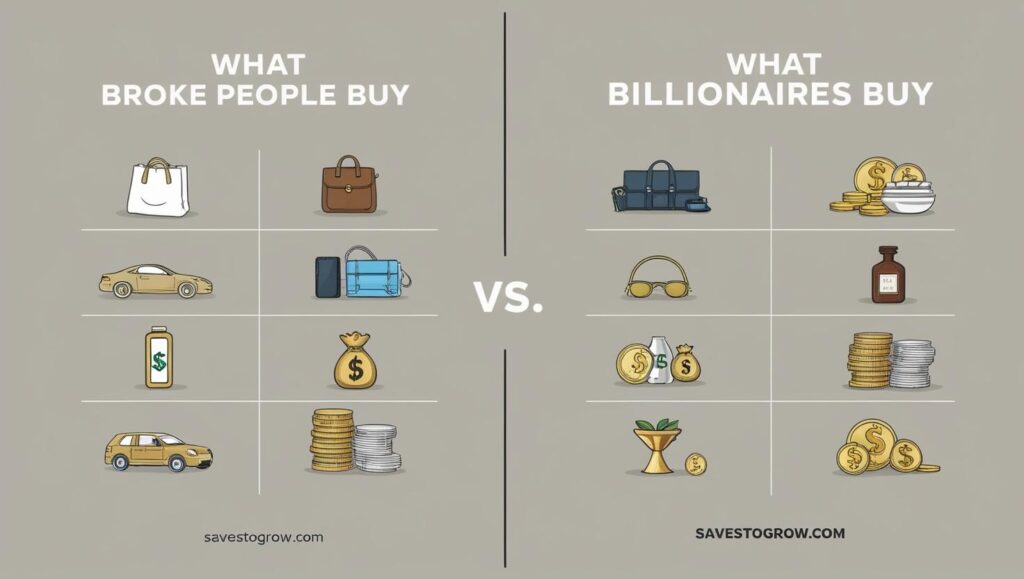Borrowing Smart Financial Habits That Work
Let’s get one thing clear—billionaires don’t just work harder.
They play a different game entirely.
And while you may not have a private jet or offshore trust (yet), you can borrow the very financial habits that built their empires—legally, ethically, and effectively.
This isn’t about copying their lifestyle.
It’s about stealing their strategy.
Why You Should Steal From Billionaires (Their Habits, That Is)

Most people imitate the wrong things—cars, clothes, vacations.
What should they be imitating?
- Their mental frameworks
- Their money moves
- Their timing and discipline
Because billionaires don’t get rich by accident, they build systems, follow principles, and stack advantages slowly but relentlessly.
1. Buy Assets, Not Status

Billionaires spend less than they earn—but more importantly, they spend on assets that grow.
- Jeff Bezos didn’t drop millions on watches—he reinvested in Amazon stock.
- Oprah owns media companies and real estate, not just handbags.
- Warren Buffett has lived in the same house since 1958.
How to steal it:
- Every time you’re tempted to flex, buy a share of a great business instead.
- Use a simple rule: Assets first, lifestyle later.
2. Use Debt Like a Weapon, Not a Crutch
Billionaires use debt to leverage growth, not to fund bad habits.
- Elon Musk used margin loans—not paychecks—to fund big moves.
- Real estate moguls borrow to acquire cash-flowing property, not TVs.
How to steal it:
- Only borrow if it buys you time, income, or equity.
- Avoid debt for depreciating stuff (cars, clothes, gadgets).
- Learn how good debt builds leverage without bleeding you dry.
3. Compound Relentlessly (Then Wait)
Most billionaires didn’t get rich overnight. They let compounding do the heavy lifting.
- Warren Buffett made 99% of his wealth after age 50.
- Jack Dorsey holds Bitcoin not for hype, but for long-term conviction.
How to steal it:
- Start investing early, often, and automatically.
- Focus on time in the market, not timing the market.
- Reinvest dividends, and never interrupt compounding unless it’s life or death.
4. Automate Everything Boring

Rich people don’t manually budget every dollar.
They set up systems—because systems don’t forget or get emotional.
How to steal it:
- Automate your savings, investments, and bill payments.
- Use auto-transfers the day after payday.
- Treat your future like a monthly subscription.
Billionaire behavior isn’t hustle—it’s structure.
5. Create Multiple Income Streams
Most billionaires have 3–7 active streams of income.
Salary is just a starting point, not the whole pie.
How to steal it:
- Build side hustles around your skills (freelance, coaching, content).
- Invest in REITs, dividend stocks, or low-effort businesses.
- Sell your knowledge via digital products or memberships.
Start small. One $200/month stream today could be $2,000/month in a year.
6. Think Decades, Not Days
Wealthy people play the long game.
They make moves that won’t pay off for years, but when they do, it’s exponential.
How to steal it:
- Stop chasing quick wins (trading, gambling, risky flips).
- Think: How does this decision look 10 years from now?
- Delay gratification ruthlessly. You’re not falling behind—you’re building runway.
7. Outsource Your Weaknesses

Billionaires delegate everything that slows them down—taxes, chores, admin, even decisions.
How to steal it:
- Hire a virtual assistant, accountant, or automation tool to save time.
- Use that freed time to work on income-generating skills.
- Stop doing $10 tasks when you can create $100 opportunities.
Your time is your most valuable asset. Act like it.
FAQs
Q: Do I need to be rich to use these tactics?
No. These habits work at any income level. They scale with you.
Q: Are these legal and ethical?
100%. This is about borrowing their mindset, not gaming the system.
Q: Where should I start if I’m broke?
Start with automating savings, reducing bad debt, and building your first income stream.
Q: How do I learn more?
Study people like Naval Ravikant, Ray Dalio, and Morgan Housel. Read. Then act.





